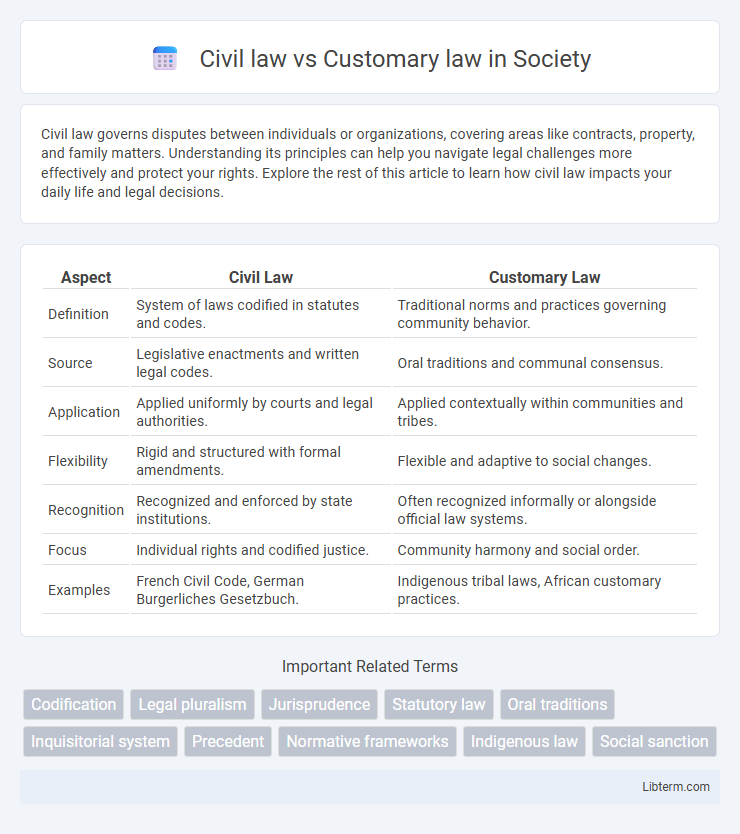Civil law governs disputes between individuals or organizations, covering areas like contracts, property, and family matters. Understanding its principles can help you navigate legal challenges more effectively and protect your rights. Explore the rest of this article to learn how civil law impacts your daily life and legal decisions.
Table of Comparison
| Aspect | Civil Law | Customary Law |
|---|---|---|
| Definition | System of laws codified in statutes and codes. | Traditional norms and practices governing community behavior. |
| Source | Legislative enactments and written legal codes. | Oral traditions and communal consensus. |
| Application | Applied uniformly by courts and legal authorities. | Applied contextually within communities and tribes. |
| Flexibility | Rigid and structured with formal amendments. | Flexible and adaptive to social changes. |
| Recognition | Recognized and enforced by state institutions. | Often recognized informally or alongside official law systems. |
| Focus | Individual rights and codified justice. | Community harmony and social order. |
| Examples | French Civil Code, German Burgerliches Gesetzbuch. | Indigenous tribal laws, African customary practices. |
Introduction to Civil Law and Customary Law
Civil law is a codified legal system based on written statutes and comprehensive legal codes that regulate private rights and obligations, commonly used in countries like France, Germany, and Japan. Customary law consists of established practices and unwritten rules developed over time, reflecting the traditions and social norms of specific communities, widely present in indigenous and tribal societies. The coexistence of civil and customary law often requires harmonization to address legal pluralism within a jurisdiction.
Historical Origins and Development
Civil law originated from Roman law, primarily codified in the Corpus Juris Civilis under Emperor Justinian in the 6th century, influencing many European legal systems. Customary law developed from unwritten traditions and practices passed down through generations within indigenous and local communities, reflecting their cultural norms and social structures. Civil law evolved through formal legislation and judicial decisions, while customary law adapted organically to community needs and oral transmission.
Key Principles of Civil Law
Civil law is founded on codified statutes and comprehensive legal codes that emphasize written laws as the primary source of legal authority. Key principles include the formal application of laws, legal certainty, and the systematic classification of rights and obligations. Customary law, in contrast, derives from traditions and social practices, often operating informally and varying across different communities.
Core Characteristics of Customary Law
Customary law is primarily characterized by its unwritten rules derived from long-standing community practices and social norms, deeply rooted in local traditions and cultural values. It is flexible, adaptive, and enforced through communal consensus rather than formal judicial systems, contrasting with the codified and systematically organized nature of civil law. Customary law emphasizes restorative justice and collective responsibility, often resolving disputes through elders or traditional authorities who ensure harmony within the community.
Sources of Authority in Civil and Customary Systems
Civil law systems derive authority primarily from codified statutes and legal codes established by legislative bodies, ensuring uniformity and predictability in legal decisions. Customary law systems base their authority on long-standing traditions, social practices, and community consensus, which are often unwritten but recognized as binding within specific cultural groups. The divergence in sources of authority between civil and customary law reflects the contrast between formal codification and socially ingrained norms shaping legal governance.
Case Studies: Application in Modern Legal Systems
Civil law systems, derived from Roman law, emphasize codified statutes and have been effectively applied in countries like France and Japan, where comprehensive legal codes provide clarity and predictability. Customary law, rooted in indigenous practices and oral traditions, remains significant in regions such as sub-Saharan Africa and the Pacific Islands, often guiding dispute resolution in local communities alongside formal courts. Case studies in countries like South Africa demonstrate the coexistence and integration of civil and customary law, highlighting challenges and opportunities in harmonizing these systems within modern legal frameworks.
Strengths and Limitations of Civil Law
Civil law excels in providing a clear, codified legal framework that ensures consistency and predictability in judicial decisions, facilitating efficient dispute resolution. Its structured statutes and comprehensive codes promote uniform application across jurisdictions but may lack flexibility to adapt quickly to unique cultural or local contexts. The rigidity of civil law can limit its responsiveness to societal changes, often requiring legislative amendments to address evolving norms and values.
Strengths and Limitations of Customary Law
Customary law offers strengths such as deep cultural relevance, community-based dispute resolution, and flexibility in adapting to local social norms. However, its limitations include inconsistent application, lack of formal codification, and potential conflicts with national or international legal standards. These factors can affect the predictability and enforceability of customary law in broader legal systems.
Interaction and Integration in Contemporary Societies
Civil law and customary law interact dynamically in contemporary societies, often blending formal legal codes with traditional practices to address diverse cultural contexts. Integration occurs through legislative frameworks that recognize customary norms while ensuring alignment with statutory civil procedures, fostering legal pluralism. This coexistence enhances dispute resolution mechanisms by accommodating community values alongside codified law, promoting social cohesion and legal accessibility.
Conclusion: Comparative Analysis and Future Trends
Civil law systems, rooted in codified statutes and formal legal procedures, contrast with customary law's reliance on community traditions and unwritten norms, shaping diverse dispute resolution methods worldwide. Comparative analysis reveals increasing integration of customary law principles within civil law frameworks to enhance local relevance and cultural legitimacy. Future trends suggest ongoing hybridization, digitalization of legal processes, and stronger recognition of indigenous legal customs in global jurisprudence.
Civil law Infographic

 libterm.com
libterm.com